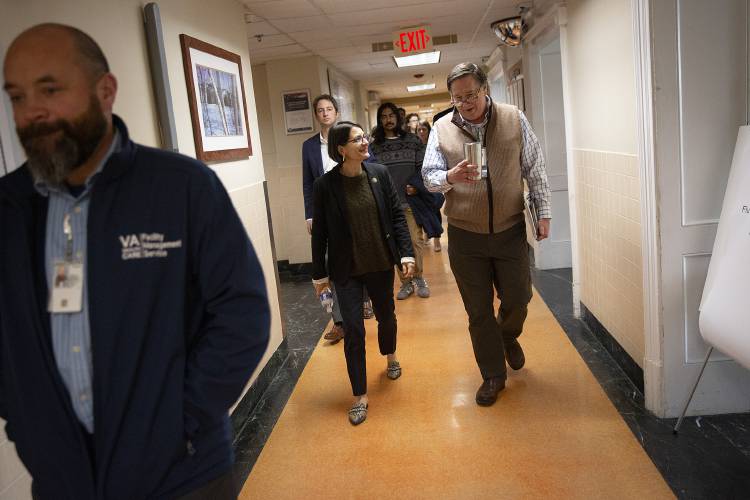Congresswoman tours VA medical center, meets veterans
| Published: 11-01-2023 9:58 PM |
WHITE RIVER JUNCTION — On her first visit to the White River Junction VA Medical Center since becoming Vermont’s sole representative in the U.S. House earlier this year, Becca Balint, a Democrat, pledged to do her part to support the VA.
“These people have given so much for their country, they should be walking into the Taj Mahal,” Balint said while standing outside the Birches Building following a discussion with White River Junction VA leaders and a tour on Tuesday.
But, she noted, it was clear to her that veterans are able to see “beyond the chipped paint” visible on the Birches Building, which was first constructed in 1937, and are grateful for the care provided inside.
During a tour of the 14-bed residential substance use unit in the Horizon Building, a veteran from Baltimore, Vt., told Balint, 55, the care he was receiving there was “pretty awesome.” Another veteran said he’d like to see a smoking section because it was hard enough to be giving up alcohol without also having to abstain from tobacco.
An Army veteran from Massachusetts credited the VA with saving his life “quite a few times” and expressed an “attitude of gratitude.”
Balint’s father was in the U.S. Army and she was born on an Army base in Germany. She thanked the veterans in the substance use unit for their service and pledged to work with the rest of Vermont’s federal delegation, Sens. Bernie Sanders, an independent, and Peter Welch, a Democrat, to continue to support the VA.
In conversations with the facility’s leaders, Balint acknowledged that there might be little she could do alone in a divided Congress as the possibility of a federal shutdown looms. But suggested she might be able to work with representatives from places like Maine and Idaho, which also have rural medical centers, to ensure support for the facilities continues.
The White River Junction facility is the most rurally based comprehensive multi-specialty VA hospital in the VA system, Dr. Brett Rusch, the facility’s director, said in a conversation with Balint and her staff in a conference room.
Article continues after...
Yesterday's Most Read Articles
 Homeless Upper Valley couple faces ‘a very tough situation’
Homeless Upper Valley couple faces ‘a very tough situation’
 Crane crash on Interstate 89
Crane crash on Interstate 89
 Kenyon: Constitutional rights should trump Dartmouth’s private interests
Kenyon: Constitutional rights should trump Dartmouth’s private interests
 West Lebanon crash
West Lebanon crash
 Editorial: Response to campus protests only adds fuel to the fire
Editorial: Response to campus protests only adds fuel to the fire
In collaboration with Dartmouth Health and the University of Vermont Health Network, the White River Junction VA also plays a role in training health care providers, but Rusch noted, such programs are “challenging to maintain.”
Rusch said the VA provides some 40% of the training bandwidth in the region and since providers tend to stay within 60 miles of where they train, losing training programs could have negative consequences in terms of access to care for New England veterans and for the general public.
Rusch also noted that the “single biggest impediment” to hiring and retaining employees in the region is affordable housing. Another challenge is transportation, including ambulances, he said.
Housing, Balint said, is “one of my main concerns and has been for years.” She is planning to roll out a housing proposal in the next month or so. “It’s dire,” she said.
VA officials credited the state’s federal delegation for bringing in the funding necessary to support ongoing renovations to the facility’s aging infrastructure and outlined their concerns about the declining population of veterans in New England and the effect that sending veterans to community care may have on eroding the VA’s ability to provide services.
Given the declining numbers of veterans and the difficulty people in the community have in accessing mental health care, Balint asked Rusch whether he thinks there might be an opportunity to expand the VA’s mission in that area and offer mental health services to relatives of veterans.
Rusch, a trained psychiatrist, said he and his team are “receptive to this idea” and that Sanders, a staunch VA supporter, has “posited a pilot” in this area.
Rusch noted that in 2021, during the COVID-19 pandemic emergency, the White River Junction VA contracted with the state to temporarily offer inpatient mental health treatment to non-veterans. The facility has a 12-bed inpatient mental health unit.
Salissa Wahlers, a social worker who serves as LGBTQ+ care coordinator at the White River Junction VA, said via Zoom during the conference room visit with Balint that she had just had a session with a veteran who had been perpetrating domestic violence.
Wahlers said the veteran told her that he wished his partner could have access to the mental health support he is getting.
It’s “challenging for his family,” she said. “We can provide all sorts of resources.”
Rusch noted that challenges of the partisan political climate in Washington have reached the Upper Valley.
“People worry about what happens if there’s a shutdown,” he said. “It makes people worry about things that they don’t have to.”
Balint, who sits on House judiciary and budget committees, also expressed concerns about the situation in Washington.
She described the new House Speaker Mike Johnson, R-La., as an “extremist,” citing his efforts to undermine the results of the 2020 election, his support of a national abortion ban and his opposition to gay marriage.
She pointed to a Republican plan to provide U.S. support for Israel by cutting from the IRS. “This isn’t serious,” she said, adding that political positioning like that “erodes confidence” in the government.
“This is his first rodeo,” Balint said of Johnson’s lack of congressional leadership experience. “I wish that I felt hopeful.”
Nora Doyle-Burr can be reached at ndoyleburr@vnews.com or 603-727-3213.




